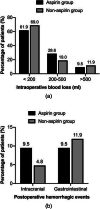Evaluating the safety of early surgery for ruptured intracranial aneurysms in patients with long-term aspirin use: a propensity score matching study
- PMID: 33292864
- PMCID: PMC7702666
- DOI: 10.1186/s41016-020-00216-y
Evaluating the safety of early surgery for ruptured intracranial aneurysms in patients with long-term aspirin use: a propensity score matching study
Abstract
Background: Early microsurgical clipping is recommended for ruptured intracranial aneurysms to prevent rebleeding. However, dilemma frequently occurs when managing patients with current acetylsalicylic acid (aspirin) use. This study aimed to examine whether aspirin use was associated with worse outcomes after early surgery for aneurysmal subarachnoid hemorrhage (aSAH).
Methods: We retrieved a consecutive series of 215 patients undergoing early microsurgical clipping within 72 h after aneurysmal rupture from 2012 to 2018 in the neurosurgery department of Beijing Tiantan Hospital. The medical records of each case were reviewed. Twenty-one patients had a history of long-term aspirin use before the onset of aSAH, and 194 patients did not. To reduce confounding bias, propensity score matching (PSM) was performed to balance some characteristics of the two groups. The intraoperative blood loss, postoperative hemorrhagic events, postoperative hospital stay, and functional outcome at discharge were compared between aspirin and non-aspirin group.
Results: We matched all the 21 patients in aspirin group with 42 patients in non-aspirin group (1:2). Potential confounding factors were corrected between the two groups by PSM. No hospital mortality occurred after surgery. No significant differences were found in intraoperative blood loss (P = 0.540), postoperative hemorrhagic events (P > 0.999), postoperative hospital stay (P = 0.715), as well as functional outcome at discharge (P = 0.332) between the two groups.
Conclusions: Our preliminary results showed that long-term low-dose aspirin use was not associated with worse outcomes. Early surgery can be safe for ruptured intracranial aneurysms in patients with long-term aspirin use.
Keywords: Antiplatelet; Aspirin; Early surgery; Intracranial aneurysm; Subarachnoid hemorrhage.
Conflict of interest statement
The authors declare that they have no competing interests.
Figures
References
-
- Antithrombotic Trialists C, Baigent C, Blackwell L, Collins R, Emberson J, Godwin J, et al. Aspirin in the primary and secondary prevention of vascular disease: collaborative meta-analysis of individual participant data from randomised trials. Lancet. 2009;373(9678):1849–1860. doi: 10.1016/S0140-6736(09)60503-1. - DOI - PMC - PubMed
-
- Burger W, Chemnitius JM, Kneissl GD, Rucker G. Low-dose aspirin for secondary cardiovascular prevention - cardiovascular risks after its perioperative withdrawal versus bleeding risks with its continuation - review and meta-analysis. J Intern Med. 2005;257(5):399–414. doi: 10.1111/j.1365-2796.2005.01477.x. - DOI - PubMed
Grants and funding
LinkOut - more resources
Full Text Sources
Miscellaneous

